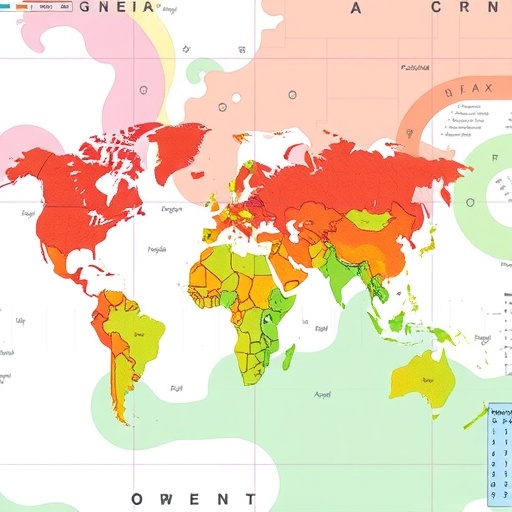In a groundbreaking study that shapes the future of urban land use efficiency assessments, researchers Zhong, C., Peng, L., Yu, J., and their colleagues shine a light on the complexities associated with urban development and land utilization across the globe. Urbanization is proceeding at an unprecedented pace, with more than half of the world’s population now residing in urban areas. As cities continue to grow, addressing how we utilize urban land becomes critical, not only for environmental sustainability but also for the health and well-being of urban inhabitants. This article dives deep into the essential findings of their research published in Communications Earth & Environment.
The core of the research revolves around the premise that urban land use efficiency (ULUE) has traditionally been assessed without comprehensive methodology. Conventional metrics often lead to misrepresentation of actual efficiency, causing gaps in policy formulation and urban planning. The study highlights the necessity for a more reliable framework that incorporates a range of factors influencing land use beyond mere spatial distribution. This includes social equity, economic viability, and environmental integrity—elements that are often overlooked in traditional assessments.
Through innovative approaches, the researchers have developed a multi-dimensional model that enhances the reliability of ULUE measurements. Their model integrates quantitative data with qualitative insights, allowing a nuanced understanding of urban land use dynamics. By employing advanced data analytics and machine learning techniques, they have set a new precedent for how urban land assessments should be approached. Their research effectively demonstrates that urban efficiency cannot be adequately understood through simplistic measures of density or land allocation alone.
One of the most pressing challenges addressed in the research is the inequity inherent in urban land use. The study emphasizes that marginalized communities frequently bear the burdens of inefficient land use policies. The researchers advocate for a paradigm shift that encompasses equitable access to land resources as a fundamental element of urban planning. By integrating social justice into the urban land use efficiency equation, cities can foster more inclusive environments where all inhabitants benefit from urban settings.
Moreover, the researchers identify that geographic disparities exist within cities, reflecting vast differences in urban land utilization rates. They argue that these discrepancies often correlate with socioeconomic statuses of various neighborhoods, leading to a vicious cycle of inequity. To combat this, a significant part of the study stresses the importance of localized assessments that appreciate community-specific needs and contexts. By tailoring evaluations to reflect local realities, city planners and policymakers can develop targeted interventions that improve ULUE for all urban residents.
Yet the potential impacts of ineffective urban land use extend beyond local communities. Globally, the mismanagement of urban land contributes to pressing issues such as climate change and biodiversity loss. With urban areas being significant contributors to greenhouse gas emissions, optimizing land use becomes a critical component of broader sustainability efforts. The researchers outline how effective ULUE assessments can inform climate policies by identifying areas that hold the greatest potential for emissions reduction.
In their conclusion, the authors call for heightened collaboration among governments, academics, and urban planners to adopt their new assessment framework. This collaboration is pivotal for achieving the sustainable development goals laid out by the United Nations, particularly in relation to sustainable cities and communities. The researchers believe that a unified approach to ULUE can lead to groundbreaking changes in how we understand urban environments and their capabilities for sustainability.
The foundation for their extensive research was laid through a comprehensive review of existing literature, which revealed significant gaps in methodologies and metrics applied in previous studies. The researchers note that many urban land assessments fell short of addressing critical factors such as land sociocultural implications and economic dynamics. Citing this lack of depth, they were motivated to develop a framework that not only filled these gaps but also innovated beyond traditional practices.
As part of their study, the researchers also employed case studies from diverse international contexts. This methodology showcased how varied urban landscapes could benefit from their proposed ULUE assessment framework. By highlighting success stories and cautionary tales from different parts of the world, the authors illustrated the universal necessity of adapting urban land policies to local conditions while adhering to more global efficiency standards.
Ultimately, this innovative research lays the groundwork for future studies on urban land use assessments. The obligation of urban planners and policymakers to adopt more comprehensive evaluation frameworks cannot be overstated. Urban land management must evolve to embrace complexity, ensuring that all voices are heard in the conversations surrounding city planning and development. The implications of this research are vast and far-reaching, promising a more equitable and sustainable urban future.
In summary, the researchers’ findings serve as a clarion call for a reevaluation of urban land use efficiency. Recognizing the intricate interplay of social, environmental, and economic factors is paramount to fostering sustainable urban ecosystems. As the world continues to urbanize at an alarming rate, this research not only provides a blueprint for better efficiency assessments but also inspires hope for a more equitable urban landscape.
The study concludes with a call to action, urging cities worldwide to adopt the new frameworks proposed. The benefits of improved urban land use efficiency extend beyond mere statistics; they promise a transformative impact on urban life, the environment, and societal equity. As urban populations expand, the urgency for precise assessments and equitable land use has never been clearer—a crucial step in achieving a sustainable urban future for generations to come.
Subject of Research: Urban Land Use Efficiency Assessments
Article Title: Toward more reliable, complete, and equitable global urban land use efficiency assessments
Article References:
Zhong, C., Peng, L., Yu, J. et al. Toward more reliable, complete, and equitable global urban land use efficiency assessments.
Commun Earth Environ (2025). https://doi.org/10.1038/s43247-025-03033-2
Image Credits: AI Generated
DOI: 10.1038/s43247-025-03033-2
Keywords: Urban Land Use, Efficiency Assessments, Sustainable Development, Social Equity, Urban Planning




